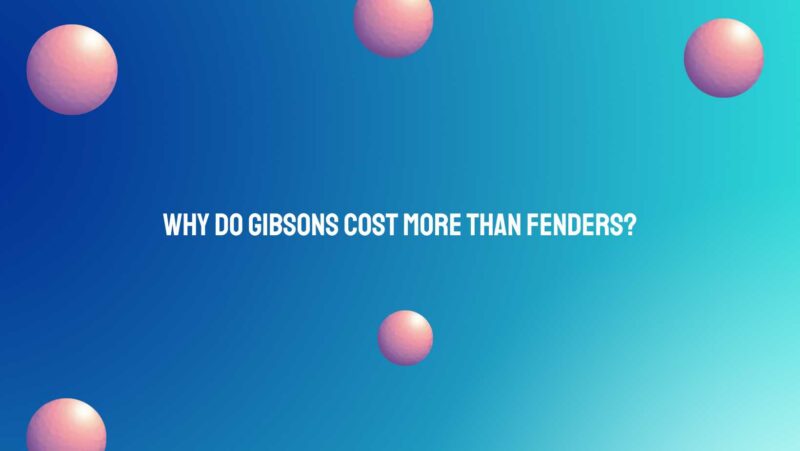One of the most common questions in the world of electric guitars is: Why do Gibsons cost more than Fenders? This price disparity between two iconic guitar manufacturers, Gibson and Fender, has puzzled and intrigued musicians and enthusiasts for decades. In this comprehensive article, we will explore the various factors that contribute to the higher price tag of Gibson guitars compared to Fender guitars.
- Craftsmanship and Materials
Gibson’s reputation for meticulous craftsmanship and the use of high-quality materials is a significant factor in the higher cost of their guitars. Some of the factors include:
a. Premium Wood Selection: Gibson often uses carefully selected, high-quality woods such as mahogany, maple, and rosewood for their bodies and necks. These woods are known for their tonal characteristics and aesthetics, but they also come at a higher cost.
b. Handmade Processes: Many Gibson models, especially in their Custom Shop series, involve a significant amount of handcrafting and attention to detail. This handwork can be time-consuming, leading to higher labor costs.
c. Nitrocellulose Finishes: Gibson frequently uses nitrocellulose lacquer finishes, which are time-consuming to apply and provide a vintage aesthetic. Nitro finishes are more costly than the polyurethane finishes used on many Fender models.
- Customization Options
Gibson offers a wide range of customization options through their Custom Shop and Made to Measure programs. These programs allow customers to select specific woods, finishes, pickups, and other features tailored to their preferences. Such customization adds to the overall cost of the guitar.
- Iconic Models
Certain Gibson models, such as the Les Paul and ES series, have achieved legendary status in the world of music. The heritage and history associated with these iconic models contribute to their higher price point. These guitars are often seen as collector’s items and command premium prices.
- Handmade vs. Mass Production
While Fender produces guitars through both handmade and mass-production methods, Gibson’s focus on handcrafting and smaller production runs can drive up costs. Fender, in contrast, offers a wider range of affordable options due to its larger-scale manufacturing processes.
- Research and Development
Gibson invests heavily in research and development to create new innovations and improve existing designs. This commitment to innovation can lead to higher costs, which are passed on to the consumer.
- Artist Endorsements and Limited Editions
Gibson frequently collaborates with renowned artists to create signature models, which often feature unique specifications and premium materials. These limited-edition guitars are positioned as collector’s items and typically come with higher price tags.
- Market Demand and Brand Prestige
The perceived prestige associated with the Gibson brand contributes to its higher pricing. Guitarists often view Gibson guitars as premium instruments, and this reputation allows the company to command premium prices.
Conclusion
In conclusion, the higher cost of Gibson guitars compared to Fender guitars can be attributed to a combination of factors, including craftsmanship, materials, customization options, iconic models, production methods, research and development, and market demand. While Gibson’s focus on premium materials, handcrafting, and customization makes their guitars more expensive, Fender offers a wider range of affordable options to cater to a broader audience.
Ultimately, the choice between Gibson and Fender should be based on individual preferences, playing style, and budget. Both brands have made significant contributions to the world of music, and their guitars continue to be cherished by musicians worldwide, whether they opt for the rich, resonant tones of a Gibson or the bright, clear sound of a Fender.


